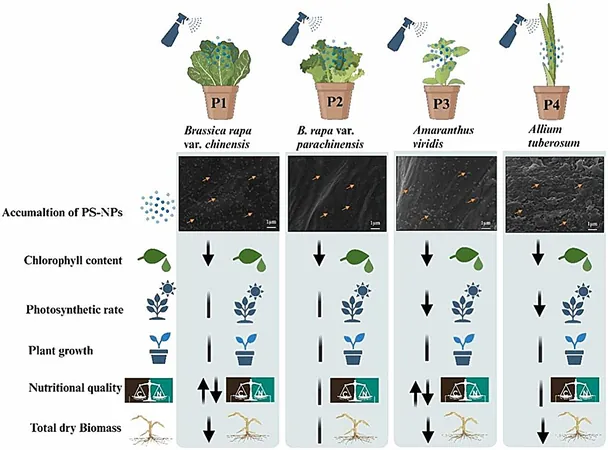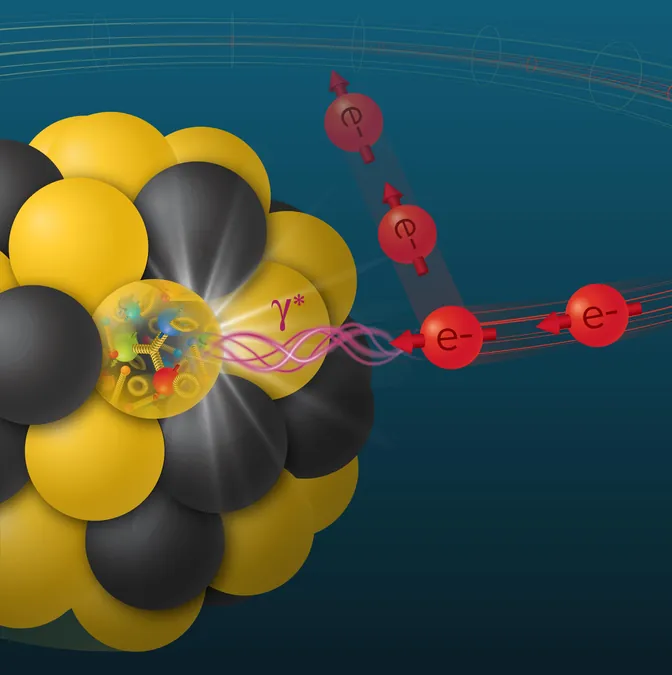
Alarming Discovery: Polystyrene Nanoplastics Found in Leafy Vegetables Threaten Our Food Supply!
2024-11-07
Author: Daniel
Groundbreaking Study on Polystyrene Nanoplastics (PS-NPs) in Leafy Vegetables
A groundbreaking study has revealed that polystyrene nanoplastics (PS-NPs) are quietly infiltrating the leaves of our leafy vegetables, posing a significant threat to plant health and the safety of our food supply. As plastic debris continues to fragment into smaller micro-nanoplastics (MNPs) due to various environmental conditions, researchers are becoming increasingly concerned about the implications for plant productivity and nutritional value.
Research Overview
Conducted by scientists at the Xishuangbanna Tropical Botanical Garden (XTBG), the research dives deep into how these harmful particles accumulate in four common leafy vegetables: Brassica rapa var. chinensis, Amaranthus viridis, Brassica rapa var. parachinensis, and Allium tuberosum. The study meticulously measured the impact of PS-NPs on plant health through controlled experiments with varying concentrations of these microscopic pollutants.
Mechanism of Accumulation
Using advanced microscopy techniques, the researchers unveiled that foliar uptake of PS-NPs varies not only by species but also by the structural characteristics of the leaves. The study found that plants with smoother surfaces and fewer protective features, such as trichomes and epicuticular wax, were particularly susceptible to accumulating these hazardous particles. Alarmingly, smaller PS-NPs exhibited a remarkable ability to penetrate the cuticle and epidermis of leaves, leading to detrimental physiological changes.
Impact on Plant Health
The consequences of PS-NP exposure don’t stop at mere accumulation; the study highlights a concerning reduction in chlorophyll content and photosynthesis rates in exposed plants. This leads to stunted growth, diminished nutritional quality, and overall decline in plant fitness. The findings emphasize an urgent need for further investigation into how these nanoplastics could compromise agricultural productivity and food security.
Expert Warning
Xu Guorui, a prominent researcher associated with the study, warns, 'We must take the accumulation of polystyrene nanoplastics and their potential ecological risks very seriously—especially in the realms of agriculture and environmental protection.'
Call to Action
As the world grapples with rising plastic pollution, this study is a clarion call for both consumers and policymakers to reassess our relationship with plastic products in agriculture. As the food we consume becomes increasingly threatened by microplastics, one has to wonder: Are we unknowingly poisoning our own food supply? Stay informed and join the conversation on how we can combat this looming crisis for the sake of our health and the environment!




 Brasil (PT)
Brasil (PT)
 Canada (EN)
Canada (EN)
 Chile (ES)
Chile (ES)
 España (ES)
España (ES)
 France (FR)
France (FR)
 Hong Kong (EN)
Hong Kong (EN)
 Italia (IT)
Italia (IT)
 日本 (JA)
日本 (JA)
 Magyarország (HU)
Magyarország (HU)
 Norge (NO)
Norge (NO)
 Polska (PL)
Polska (PL)
 Schweiz (DE)
Schweiz (DE)
 Singapore (EN)
Singapore (EN)
 Sverige (SV)
Sverige (SV)
 Suomi (FI)
Suomi (FI)
 Türkiye (TR)
Türkiye (TR)